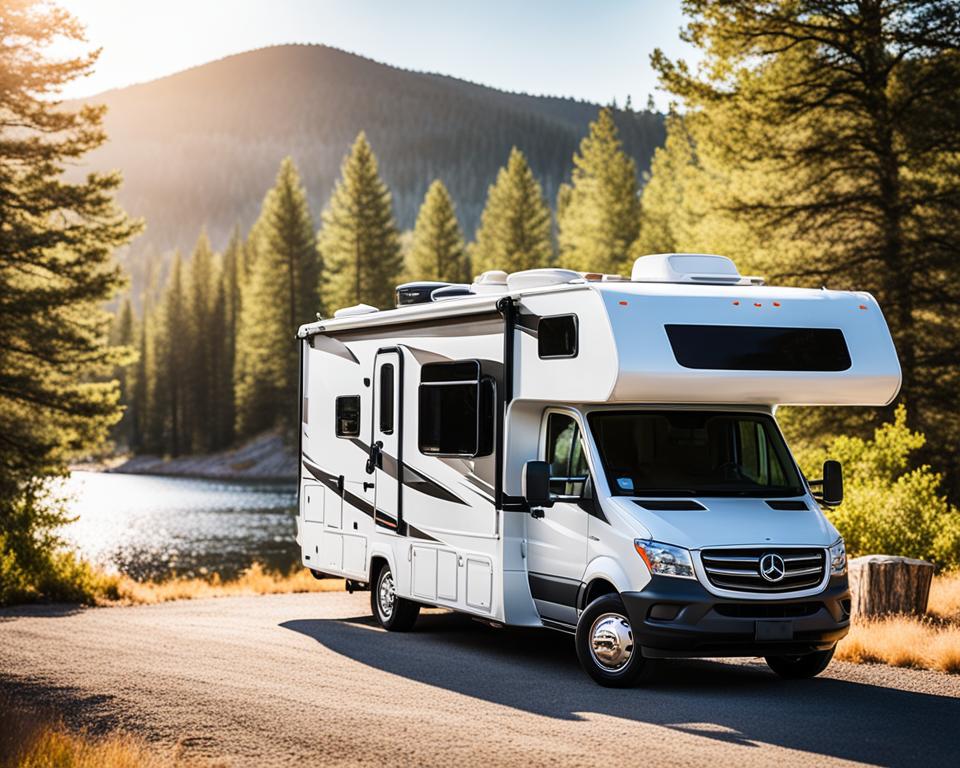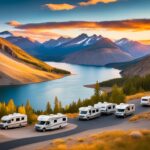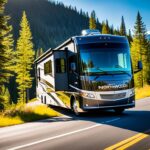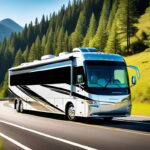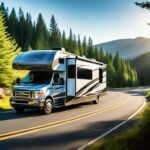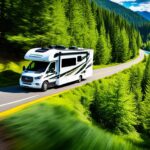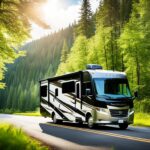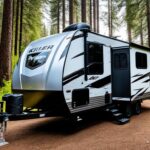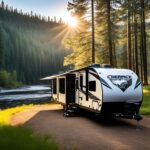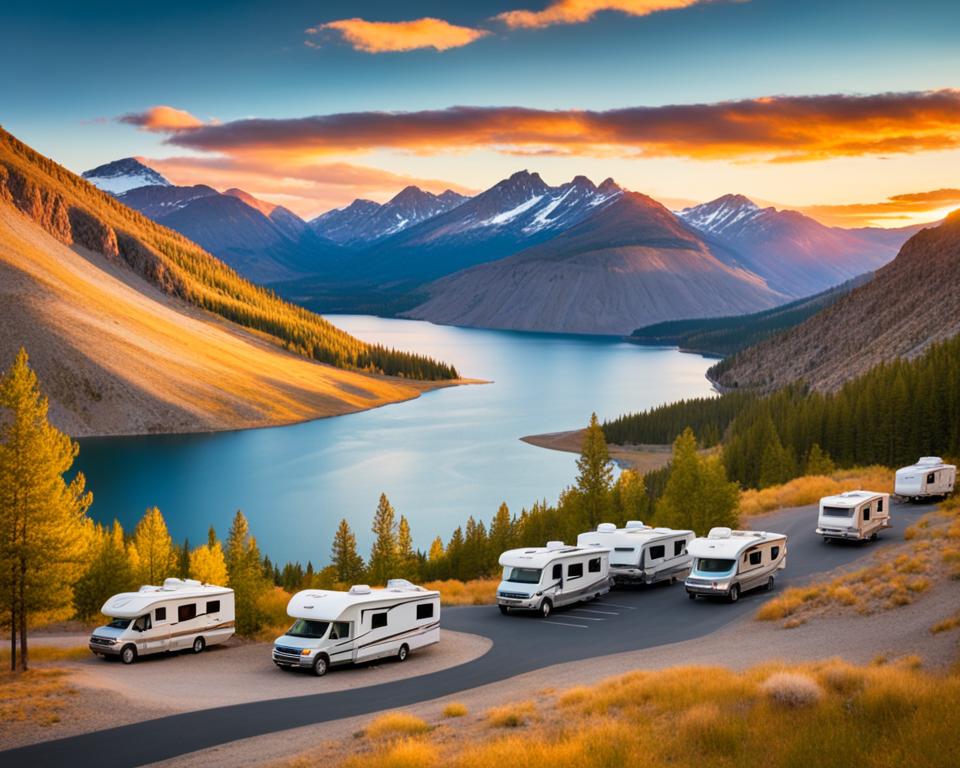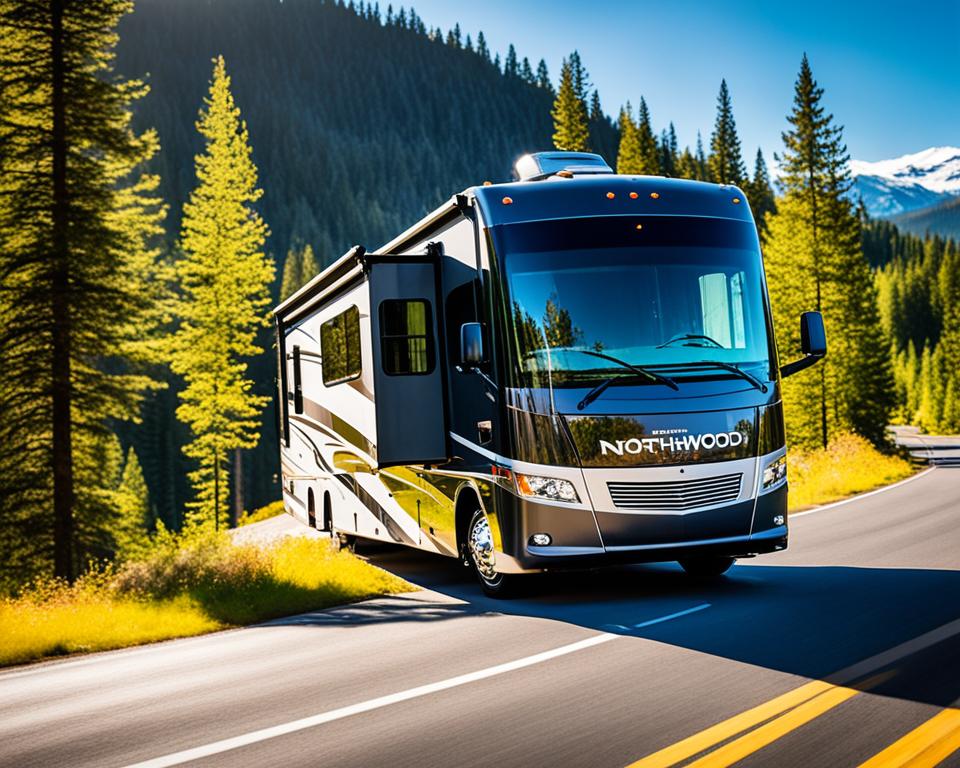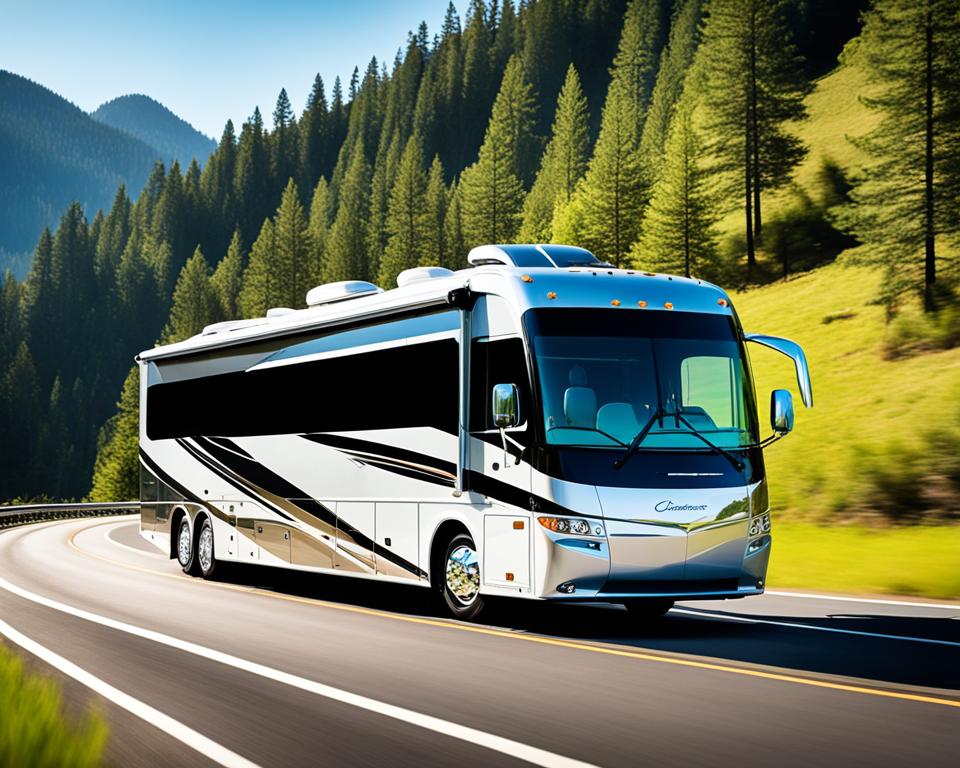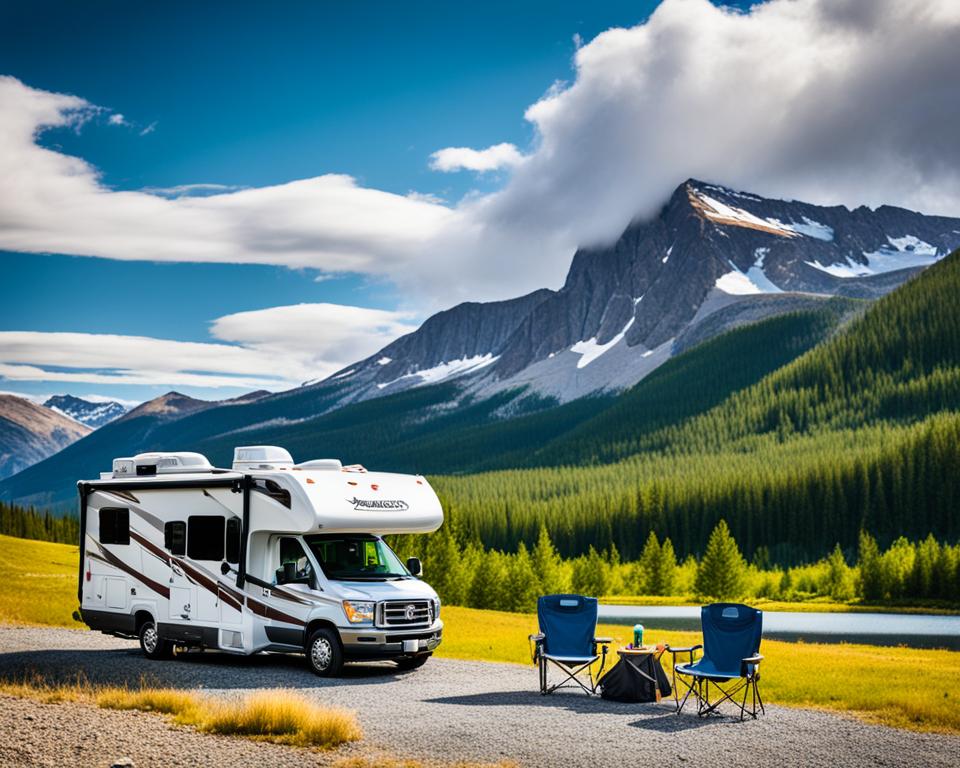Embarking on a minimalist RV lifestyle can be an exciting and liberating experience. For beginners, it may seem overwhelming at first, but with the right tips and tricks, living minimally in an RV can become second nature.
When it comes to RV living, it’s important to understand the costs associated with this lifestyle. From buying the RV itself to park fees, utilities, maintenance, insurance, and gas expenses, there are several factors to consider. However, the beauty of minimalist RV living is that you don’t have to be out of debt to start, and working remotely is possible while living on the road.
So, if you’re ready to embrace the minimalist RV lifestyle, keep reading for valuable tips and tricks that will make your journey a success.
Key Takeaways:
- Minimalist RV living offers freedom and simplicity for beginners
- Understanding the costs associated with full-time RV living is crucial
- You don’t have to be debt-free to start an RV lifestyle
- Working remotely is possible while living on the road
- Embrace minimalism and enjoy the freedom of the RV lifestyle
The Cost of Full-Time RV Living
When considering the shift to full-time RV living, one of the most important factors to consider is the cost. Understanding the financial implications can help you plan your budget and decide if this lifestyle is right for you. Let’s take a closer look at the various expenses associated with living in an RV.
RV Purchase
The first and most significant cost is the purchase of an RV. Prices vary greatly depending on the type, size, and age of the vehicle. Whether you choose a motorhome, travel trailer, or camper van, it’s essential to find one that meets your needs and fits within your budget. Remember to account for any necessary repairs or upgrades when evaluating the overall cost.
Park Fees and Camping
If you plan to stay in RV parks or campgrounds, you will need to factor in park fees. These fees can vary depending on the location, amenities, and duration of your stay. Alternatively, if you prefer boondocking or staying in free camping areas, you may reduce or eliminate this expense altogether.
Utilities
Just like living in a traditional home, full-time RV living requires essential utilities such as water, sewer, and electricity. While some RV parks include these utilities in their fees, others may charge them separately. It’s important to consider these costs when budgeting for your monthly expenses.
Maintenance and Repairs
As with any vehicle, regular maintenance and unexpected repairs are part of RV ownership. It’s crucial to set aside funds for routine maintenance like oil changes, tire rotations, and inspections. Additionally, unexpected repairs can arise, so having an emergency fund is wise to avoid financial hardships.
Insurance and Roadside Assistance
Securing insurance coverage for your RV is essential to protect your investment. The cost of insurance will vary depending on factors such as the type of RV, your driving record, and the coverage you select. Additionally, roadside assistance is highly recommended to ensure prompt assistance in case of breakdowns or other emergencies.
Gas Expenses
Traveling from one destination to another entails fuel expenses. The amount you spend on gas or diesel will depend on various factors, including the distance traveled, vehicle efficiency, and fuel prices. Planning your routes strategically and taking advantage of gas discounts can help reduce this cost.
Activities and Entertainment
While living in an RV opens up opportunities for exciting activities and experiences, it’s important to budget for these recreational expenses. Whether it’s visiting national parks, participating in outdoor adventures, or attending local events, make sure to allocate funds for entertainment and leisure activities.
Groceries and Eating Out
Food costs are a regular expense, regardless of where you live. When budgeting for RV living, consider the cost of groceries, dining out, and cooking supplies. Utilizing local markets, preparing meals in your RV’s kitchen, and eating out in moderation can help manage these costs.
Internet and Laundry
Staying connected is important for many full-time RVers. Including internet expenses in your budget ensures you can have reliable online access while on the road. Additionally, budgeting for laundry expenses at laundromats or RV parks will help you maintain cleanliness and convenience during your travels.
Subscription Entertainment and Cell Phone Expenses
If you enjoy streaming services, magazine subscriptions, or have cell phone plans, these are additional expenses to consider. While they may seem small individually, they can add up over time. Evaluating your entertainment needs and finding cost-effective plans can help you stay within your budget.
Propane, Water, Sewer, and Mail Forwarding Services
Other miscellaneous costs to consider include propane for cooking and heating, water refills, sewer dump fees, and mail forwarding services. While these expenses may seem minor, accounting for them in your budget will ensure you have a comprehensive view of your monthly costs.
In conclusion, the cost of full-time RV living can vary significantly depending on factors such as travel style, park fees, utilities, maintenance, insurance, gas expenses, activities, groceries, and entertainment. By carefully considering these costs and budgeting accordingly, you can have a clear understanding of the financial commitment involved in embracing the RV lifestyle.
Tips for Budgeting for RV Living
When embarking on the exciting journey of full-time RV living, budgeting becomes a crucial aspect of financial planning. By implementing these practical tips, you can ensure that your dream of exploring the open road is supported by a solid financial foundation.
1. Choose the Right RV within Your Budget
Before you hit the road, it’s essential to select an RV that fits your budget. Research different models and consider factors such as size, amenities, and fuel efficiency. By finding a balance between your wants and needs, you can make a wise investment that aligns with your financial goals.
2. Plan Your Itinerary and Research Campsites
To stay within your budget, carefully plan your itinerary and research more affordable campsites. Some campsites may offer discounted rates for longer stays or provide amenities that can help you save on utilities. By proactively seeking out budget-friendly options, you can stretch your dollar further while enjoying new destinations.
3. Consider All Costs
When budgeting for RV living, it’s essential to consider all the associated costs. This includes park fees, utilities, maintenance, insurance, gas expenses, activities, groceries, entertainment, and internet. By accounting for these expenses upfront, you can avoid unexpected financial burdens along the way.
4. Be Flexible
Flexibility is key to successful RV living on a budget. Embrace spontaneity and be open to changing your plans based on budget-friendly opportunities that arise. By remaining flexible, you can take advantage of last-minute deals, discover hidden gems, and adapt to unexpected changes in your financial situation.
5. Choose Affordable Campsites
Opting for affordable campsites can significantly impact your overall budget. Consider staying at public campgrounds, state parks, or Bureau of Land Management (BLM) sites, which often offer lower fees compared to private RV parks. These options allow you to experience nature while minimizing your accommodation expenses.
6. Cook at Home and Use Public Wi-Fi
Eating out can quickly deplete your budget. Save money by preparing meals in your RV’s kitchen and enjoying picnics at scenic locations. Additionally, take advantage of public Wi-Fi available at campgrounds, cafes, and libraries to reduce your internet expenses while staying connected on the road.
7. Downsize your Possessions
To avoid clutter and unnecessary expenses, downsize your possessions before hitting the road. Embrace a minimalist lifestyle and prioritize the items that truly enhance your RV living experience. By decluttering, you not only create more space, but you also save on storage costs and potential weight-related fuel expenses.
Cost Considerations for RV Living
| Expense | Estimated Cost |
|---|---|
| Park Fees | $300 – $1,000 per month |
| Utilities | $100 – $300 per month |
| Maintenance | $500 – $1,000 per year |
| Insurance | $1,000 – $2,000 per year |
| Gas Expenses | $300 – $500 per month |
| Activities | $100 – $300 per month |
| Groceries | $300 – $500 per month |
| Entertainment | $100 – $200 per month |
| Internet | $50 – $100 per month |
By following these budgeting tips and being mindful of your expenses, you can comfortably navigate the financial aspects of full-time RV living. Embrace the freedom of the open road while ensuring a stable financial future.
Choosing the Right RV for Full-Time Living
When it comes to full-time RV living, choosing the right RV is a crucial decision that can greatly impact your overall experience. With various types of RVs available, it’s important to consider your personal preferences and lifestyle needs before making a choice.
Here are the main types of RVs to consider:
1. Class A Motorhomes
If you value space and luxury, a Class A motorhome may be the right choice for you. These are the largest and most luxurious RVs available, offering ample living space, full-size amenities, and plenty of storage. Class A motorhomes are ideal for those who prioritize comfort and are willing to invest in a higher budget.
2. Class B Campervans
If you prefer a smaller and more maneuverable RV, a Class B campervan might be the perfect fit. These compact vehicles are easy to drive and park, making them ideal for solo travelers or couples. Class B campervans offer basic amenities but often have limited living space.
3. Class C Motorhomes
For those seeking a balance between space and maneuverability, Class C motorhomes are a popular choice. They are slightly smaller than Class A motorhomes but still offer comfortable living spaces and amenities. Class C motorhomes are suitable for small families or RVers who want more space without sacrificing maneuverability.
4. Travel Trailers
If you already have a vehicle capable of towing, a travel trailer might be a cost-effective option for full-time living. Travel trailers come in various sizes and offer an extensive range of floor plans and amenities. They provide the flexibility to detach from the towing vehicle, allowing you to explore your destination without the bulk of a larger RV.
Each type of RV has its pros and cons, which should be carefully considered based on your specific needs. The table below summarizes the key features of each type:
| Type | Size | Amenities | Maneuverability | Fuel Efficiency |
|---|---|---|---|---|
| Class A Motorhomes | Largest | Full-size | Low | Low |
| Class B Campervans | Smallest | Basic | High | High |
| Class C Motorhomes | Medium | Comfortable | Medium | Medium |
| Travel Trailers | Varies | Varies | N/A | Depends on towing vehicle |
Remember to consider factors such as budget, desired amenities, driving preferences, and fuel efficiency when choosing the right RV for your full-time living adventure. Finding the perfect RV will ensure that you have a comfortable and enjoyable home on wheels as you embark on your RV lifestyle journey.
Planning and Preparation for RV Living
Preparing for RV living is a crucial step before embarking on your adventure on the road. This section will guide you through the essential aspects of downsizing, RV maintenance, and inspections to ensure a smooth and enjoyable experience.
Downsizing for RV Life
One of the first tasks in preparing for RV living is downsizing your possessions. Since storage space is limited in an RV, it’s important to let go of unnecessary items and embrace a minimalist lifestyle. Consider what belongings are truly essential and donate, sell, or store the rest. Maximize the available space by using collapsible furniture, storage bins, and clever organizational solutions. This will not only create a clutter-free environment but also help you fully enjoy the freedom of life on the road.
RV Maintenance and Inspections
Maintaining your RV and ensuring its roadworthiness is critical for a safe and stress-free journey. Regular maintenance and inspections can save you from unexpected breakdowns and costly repairs. Conduct thorough inspections of your RV’s tires, brakes, lights, and essential components. Check for any signs of wear and tear or potential issues that may need attention. Prioritize regular servicing and oil changes to keep your engine running smoothly. It’s also advisable to learn basic maintenance skills like tire changing and checking the oil level, which will empower you to handle minor issues on the road.
“Maintaining your RV and ensuring its roadworthiness is critical for a safe and stress-free journey.”
Additionally, don’t forget to inspect your RV’s plumbing and electrical systems, including the water heater, water pump, and power outlets. Familiarize yourself with the operation and troubleshooting of these systems, enabling you to resolve common issues that may arise while on the road. Investing time in understanding your RV’s maintenance needs and keeping up with regular inspections will contribute to a worry-free and enjoyable RV lifestyle.
| RV Maintenance Checklist | Frequency |
|---|---|
| Tire inspection and rotation | Every 5,000 miles or every 6 months |
| Brake inspection | Annually or as recommended by the manufacturer |
| Engine oil change | Every 3,000 to 5,000 miles or as recommended by the manufacturer |
| RV battery maintenance | Every 3 months |
| Plumbing system inspection | Annually |
| Electrical system inspection | Annually |
Following a regular maintenance schedule and keeping your RV in optimal condition will provide peace of mind and help prevent any unexpected maintenance issues during your travels.
By downsizing your possessions, conducting regular RV maintenance, and learning basic maintenance skills, you’ll be well-prepared for the exciting journey of RV living. The next section will delve into staying connected on the road, ensuring you never miss a beat while enjoying your new mobile lifestyle.
Staying Connected on the Road
For full-time RVers, staying connected while RVing is essential to maintain communication, access information, and stay connected to the world. Whether it’s for work, leisure, or simply staying in touch with loved ones, having reliable internet access in an RV is crucial.
There are several options to consider for internet access in an RV. One option is investing in a cell signal booster. This device amplifies the cell signal, improving reception in areas with spotty coverage. By boosting the signal strength, RVers can enjoy a more reliable internet connection, even in remote areas.
Another option is satellite internet. Although it can be more expensive, satellite internet offers reliable connectivity regardless of location. Satellite dishes installed on the RV enable users to access the internet wherever they go. This is particularly useful for RVers who frequently travel to remote areas with limited cell coverage.
Utilizing public Wi-Fi at RV parks and campgrounds is another cost-effective way to access the internet while on the road. Many RV parks and campgrounds offer free or affordable Wi-Fi for their guests. RVers can take advantage of these Wi-Fi networks to browse the web, check emails, or even stream content. However, it’s important to note that public Wi-Fi networks may have limited bandwidth or slower speeds during peak times, so it may not be suitable for all online activities.
To ensure a seamless online experience, it’s important for RVers to choose the option that best suits their needs and travel preferences. Whether it’s investing in a cell signal booster, opting for satellite internet, or utilizing public Wi-Fi, staying connected on the road has never been easier.
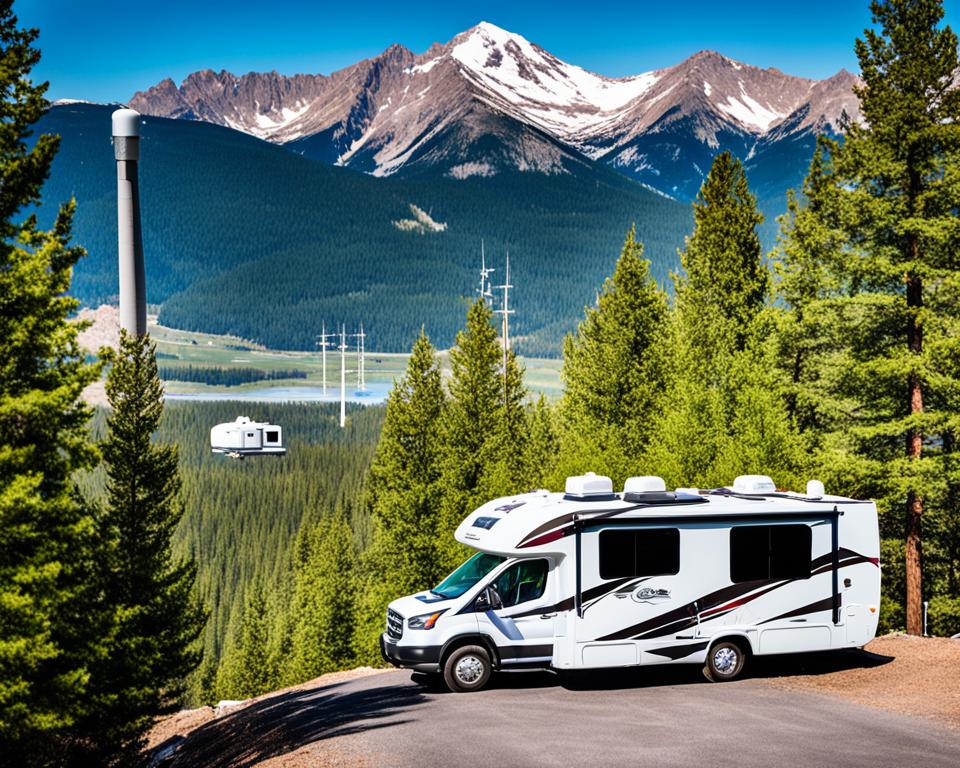
Making the Most of Limited Space in an RV
Living in a small space requires maximizing the available space and staying organized. When it comes to creating a functional and efficient living area in an RV, every inch counts. Here are some tips for maximizing space and organizing an RV for minimal living:
1. Utilize Multi-functional Furniture
Invest in furniture that serves multiple purposes to save space. Consider tables that can convert into beds, or sofas with built-in storage compartments. These versatile pieces of furniture allow you to make the most of limited space in your RV.
2. Use Storage Solutions
Utilize the power of organization by incorporating storage solutions like bins, baskets, and storage containers. These items help keep things tidy and make it easier to find what you need. Maximize vertical space by installing shelves or hanging organizers.
3. Embrace Minimalism
Living in an RV requires a mindset shift towards minimalism. Embrace a “less is more” mentality and only keep the essentials. Declutter regularly to ensure you’re not holding onto unnecessary items. Sticking to a minimalist lifestyle will help you make the most of the limited space available.
4. Get Outside
When living in a small space, it’s important to get outside and enjoy the great outdoors. Spend time exploring your surroundings, going for hikes, or simply relaxing outside. This can alleviate any feelings of claustrophobia and provide a breath of fresh air.
5. Create Zones
In order to optimize the functionality of your RV, create designated zones for different activities. Have a designated workspace for remote work or hobbies, a cooking area, and a relaxation zone. This helps to keep the space organized and ensures each area has a specific purpose.
6. Optimize Kitchen Space
The kitchen is a central area in any RV, so it’s important to optimize the available space. Use collapsible or stackable kitchenware to minimize the amount of space it takes up. Utilize vertical space by incorporating hooks or magnetic strips to hang utensils or knives.
By following these tips for maximizing space and organizing your RV, you can create a comfortable and functional living space in your minimalist home on wheels.
Safety Tips for Full-Time RV Living
When it comes to living in an RV full-time, safety should always be a top priority. Whether you’re on the road or parked at a campground, taking the necessary precautions can help ensure a secure and worry-free journey. Here are some essential safety tips to keep in mind:
- Always wear a seatbelt: Whether you’re the driver or a passenger, remember to buckle up for every trip. Seatbelts are a crucial safety measure that can help protect you in case of an accident.
- Keep the RV secure: When parked, make sure to lock all doors and windows to prevent unauthorized access. Invest in quality locks and consider installing an alarm system for added security.
- Be aware of your surroundings: Before parking in a new location, research the area and avoid isolated or high-crime rate areas. Look for well-lit and populated areas to minimize the risk of theft or other safety concerns.
- Be prepared for emergencies: Keep a well-stocked emergency kit in your RV, including essentials such as a first-aid kit, flashlights, batteries, a fire extinguisher, and emergency contact information. Familiarize yourself with the location of emergency exits and have a plan in place for various scenarios.
“Safety should always be a top priority when it comes to enjoying the full-time RV lifestyle. By following these tips, you can have peace of mind knowing that you’re taking the necessary precautions to keep yourself and your RV safe.”
RV Security Tips
RV security goes beyond personal safety and includes measures to protect your vehicle and belongings. Here are some additional security tips to consider:
- Invest in a reliable RV alarm system: Consider installing an alarm system specifically designed for RVs. These systems often include sensors for doors, windows, and motion, providing an added layer of security.
- Use visible deterrents: Displaying signs that indicate the presence of a security system or a dog can discourage potential thieves. Additionally, putting up curtains or blinds to prevent outsiders from seeing inside can add an extra level of privacy and security.
- Keep valuables out of sight: When parked, avoid leaving valuables in plain view. Store them in locked compartments or safes to minimize the risk of theft.
- Get to know your neighbors: Building relationships with fellow RVers in your campsite or community can create a sense of security. Neighbors can keep an eye on your RV while you’re away and vice versa.
By prioritizing safety and implementing these RV living safety tips and security measures, you can enjoy your full-time RV lifestyle with peace of mind, knowing that you’ve taken necessary precautions to protect yourself and your belongings.
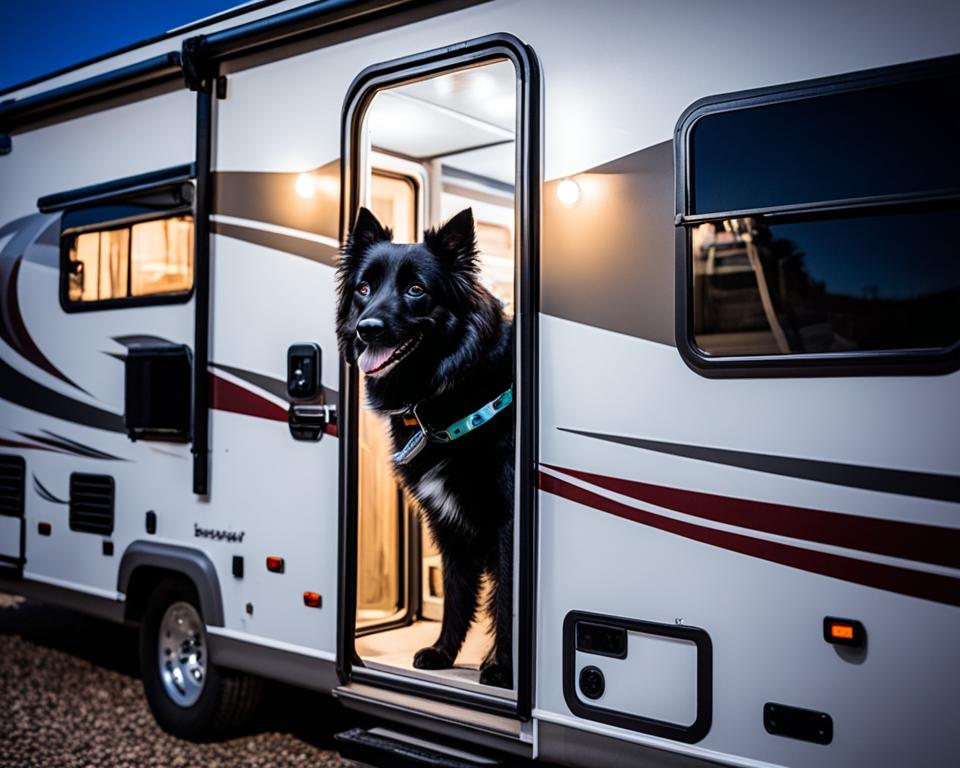
Building Community as a Full-Time RVer
Building a community as a full-time RVer is essential for combatting loneliness and finding support on the road. Connecting with other RVers not only provides a sense of camaraderie but also offers the opportunity to learn from their experiences and gain valuable insights.
Attending RV rallies and meetups is a great way to meet fellow travelers and engage in activities together. These gatherings often include organized events, workshops, and social activities that foster a sense of community and allow you to make lasting connections.
Additionally, joining online RV communities, such as forums and Facebook groups, can be incredibly valuable. These platforms provide a space for full-time RVers to ask questions, share tips and advice, and connect with like-minded individuals who understand the unique challenges and joys of life on the road. It’s a great way to stay updated on the latest RVing trends and find answers to any questions or concerns you may have.
Volunteering at campgrounds and parks is another way to build community while contributing to the RVing community as a whole. Many campgrounds and parks offer volunteer opportunities where you can help with various tasks, such as park maintenance or organizing events. This not only allows you to give back but also puts you in contact with other RVers and park staff, creating opportunities for friendships and connections.
Beyond the practical benefits, building a community as a full-time RVer provides a sense of belonging and a support network that can help make the RV lifestyle even more enjoyable and fulfilling.
Below is a table detailing different ways to build community as a full-time RVer:
| Community-Building Method | Description |
|---|---|
| Attending RV Rallies and Meetups | Join organized events, workshops, and social activities to meet fellow RVers and make lasting connections. |
| Joining Online RV Communities | Access forums and Facebook groups to connect with other full-time RVers, ask questions, and share advice. |
| Volunteering at Campgrounds and Parks | Contribute to the RVing community by volunteering at campgrounds and parks, connecting with other RVers and park staff. |
By actively seeking out community-building opportunities, you can enrich your full-time RVing experience, create lifelong friendships, and find valuable support along your journey.
Overcoming Challenges of Full-Time RV Living
While full-time RV living offers a unique and adventurous lifestyle, it also comes with its fair share of challenges to overcome. From feelings of loneliness to RV maintenance issues, it’s important to be prepared and proactive in finding solutions.
Combating Loneliness as a Full-Time RVer
One of the common challenges faced by full-time RVers is the potential for loneliness. Spending long periods of time on the road, away from familiar faces and social circles, can sometimes lead to feelings of isolation.
To combat loneliness, it’s essential to connect with other RVers and build a community. Consider joining RV meetups and attending gatherings where you can meet like-minded individuals who share your passion for RV living. Online communities, such as forums and social media groups, also provide valuable support networks and opportunities to connect with fellow travelers.
“The RVing community is incredibly welcoming and supportive. Participating in meetups and online forums allows you to form friendships and share experiences with people who understand the unique challenges and joys of RV living.” – Emily, full-time RVer
Overcoming RV Maintenance Issues
Maintaining an RV can present its own set of challenges, especially for those who may not be accustomed to the intricacies of RV maintenance. Mechanical issues, electrical problems, and plumbing concerns can arise unexpectedly, potentially disrupting your travels.
Learning basic maintenance skills is crucial for any full-time RVer. Taking the time to understand your RV’s systems and components can help you troubleshoot minor issues and perform regular inspections. It’s also wise to have a contingency plan in place for repairs that are beyond your expertise. Identifying reputable RV service centers and having emergency contacts readily available can minimize the impact of maintenance issues on your journey.
Remember, regular maintenance can help prevent major malfunctions, so it’s important to keep up with routine inspections and servicing.
By actively addressing challenges such as loneliness and RV maintenance, you can enhance your full-time RV living experience and embrace the freedom and adventure it offers.
Conclusion
Embracing the RV lifestyle can open up a world of adventure and freedom for beginners who are ready to delve into minimalist RV living. By implementing the tips and tricks mentioned in this guide, individuals can navigate the challenges of full-time RV living and create a fulfilling and rewarding experience on the road.
Budgeting wisely is essential, as it allows RVers to plan and allocate their resources effectively. By understanding the costs associated with full-time RV living and making well-informed decisions about park fees, utilities, maintenance, and other expenses, beginners can ensure that their journey remains financially sustainable.
Choosing the right RV is another fundamental aspect of successful RV living. By considering personal preferences, needs, and travel styles, individuals can find the perfect match among the various options available. From Class A motorhomes to travel trailers, there is a suitable choice for everyone.
Finally, planning and preparation are key to overcoming the challenges that may arise. By downsizing possessions, conducting thorough RV inspections, and learning basic maintenance skills, RVers can create a safe and organized living space. Staying connected, maximizing limited space, prioritizing safety, and building a supportive community further enhance the RV lifestyle experience.
FAQ
What is minimalist RV living?
Minimalist RV living refers to adopting a lifestyle that focuses on simplicity, minimal possessions, and reducing clutter while living in a recreational vehicle (RV).
How much does it cost to live in an RV full-time?
The cost of full-time RV living varies depending on factors like travel style, park fees, utilities, maintenance, insurance, gas expenses, activities, groceries, and entertainment. It’s important to budget for these expenses to ensure a comfortable lifestyle on the road.
How do I budget for RV living?
Budgeting for RV living involves considering the costs of park fees, utilities, maintenance, insurance, gas expenses, activities, groceries, and entertainment. Choosing affordable campsites, cooking at home, and downsizing possessions can help save money and stick to a budget.
What type of RV should I choose for full-time living?
The right RV depends on personal preferences and needs. Class A motorhomes, Class B campervans, Class C motorhomes, and travel trailers are popular options. Each type has its pros and cons in terms of size, amenities, and fuel efficiency.
How do I prepare for RV living?
Preparing for RV living involves downsizing possessions, ensuring the RV is roadworthy through inspections and maintenance, and learning basic maintenance skills. These steps are essential to maximize space and ensure a safe and functioning vehicle while on the road.
How can I stay connected while RVing?
To stay connected on the road, you can invest in a cell signal booster to improve reception, consider satellite internet for reliable access, and utilize public Wi-Fi at RV parks and campgrounds as a cost-saving option.
How can I maximize space in my RV?
Living in a small space requires maximizing available space and staying organized. Using multi-functional furniture and storage solutions like bins and baskets can help maximize space and keep things tidy.
How can I ensure safety while living in an RV full-time?
Safety is crucial when living in an RV full-time. Always wear a seatbelt while driving, keep the RV secure when parked, and be aware of your surroundings. Avoiding isolated or high-crime areas and being prepared for emergencies are also important safety measures.
How can I build a community as a full-time RVer?
Building a community as a full-time RVer can help combat loneliness and provide support. Attend RV rallies and meetups, join online RV communities like forums and Facebook groups, and consider volunteering at campgrounds and parks to connect with other RVers.
What are the challenges of full-time RV living?
Full-time RV living comes with challenges like feelings of loneliness and maintenance issues. Connecting with other RVers, learning basic maintenance skills, and having a contingency plan for repairs can help overcome these challenges.

